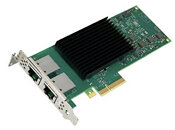Saturday, July 26th 2025

Intel Considering Spinning Off its Network and Edge Group
According to a report over at CRN, Intel is looking at spinning off its Network and Edge Group—also known as NEX—and is now looking for investors to take over the business unit. This is according to an internal memo that CRN has been privy to, and it was sent out by the Network and Edge Group lead, Sachin Katti, who has recently been promoted to Chief Technology and AI Officer at Intel. For those not familiar with the Network and Edge Group at Intel, this is the division that makes Intel's Ethernet chips and communications products, as technically it's no longer doing edge computing, since that business was merged with its Client Computing Group in September 2024.
It appears that Intel won't divest the group entirely, as the company "will remain an anchor investor in the new company." This would make sense, as it would allow Intel to continue to influence the direction of product development and still have direct access to the products the new entity will produce. Katti also wrote that this should help NEX "expand into new segments more effectively," whatever those might be, although it's unclear why Intel was unable to do this on its own. Katti continued the memo with "What we expect to change is our ability to operate with greater focus, speed and flexibility—all to better meet your needs," suggesting that Intel's customers have found other partners that better suit their requirements. Over the past few years, Intel has struggled with some of its recent 2.5 Gbps Ethernet products, as they've had several bugs that haven't been properly resolved in some cases, despite multiple hardware revisions. The company launched new 2.5 and 10 Gbps Ethernet products in the E610-series earlier this year, but there doesn't appear to have been much market uptake of the new products either. The question now is how many more business units Intel can shed, until there's nothing but the core CPU business left.
Source:
CRN
It appears that Intel won't divest the group entirely, as the company "will remain an anchor investor in the new company." This would make sense, as it would allow Intel to continue to influence the direction of product development and still have direct access to the products the new entity will produce. Katti also wrote that this should help NEX "expand into new segments more effectively," whatever those might be, although it's unclear why Intel was unable to do this on its own. Katti continued the memo with "What we expect to change is our ability to operate with greater focus, speed and flexibility—all to better meet your needs," suggesting that Intel's customers have found other partners that better suit their requirements. Over the past few years, Intel has struggled with some of its recent 2.5 Gbps Ethernet products, as they've had several bugs that haven't been properly resolved in some cases, despite multiple hardware revisions. The company launched new 2.5 and 10 Gbps Ethernet products in the E610-series earlier this year, but there doesn't appear to have been much market uptake of the new products either. The question now is how many more business units Intel can shed, until there's nothing but the core CPU business left.

50 Comments on Intel Considering Spinning Off its Network and Edge Group
This seems to often be the case with companies Intel have bought, as I mentioned elsewhere. One of many bad deals Intel made was when it bought Lantiq for US$345 million and then sold that division to MaxLinear for a mere US$150 million, five years later after having produced a ton of unsuccessful consumer gateway/router ICs.
He basically gutting the company like a pig. This is it folks, the end of a once great chip maker. Time to pull out the bugle.
ya that i225 i226 debacle didn't help things...........
MaxLinear has consumer 2.5 Gbps products and should hopefully have a 10 Gbps option coming as well and Marvell has a full range of consumer suitable products as well.
All they need is a 6Ghz all-core, 16-P-core, 0-E-core, 512MB L3 CPU (that doesn't self-destruct) at the price of a Ryzen X3D 8-core and they'll be back on top in no time. :laugh:
I dropped Intel myself, after I was not able to simply change clock of my ram to 3200 on some H-chipset. I agree I should have checked it, but I did not even think that this is gonna be like this.
AMD integrates 10 and 100 Gbps MACs in some of their CPUs, but rely on third party PHYs. Yes, it would be nice to get this into the consumer range of chips too, but for some reason AMD doesn't seem to think this makes sense.
Unless you can come up with a low cost solution like Realtek or offer something really high-end an somewhat unique, you're going to have too much competition.
They could have released a CPU ages ago, but are entering now when unified memory is in high demand and this system makes the most sense. Their networking products are also related to their GPU servers and optimized for synergistic use case scenarios with other Nvidia products.
Gsync/monitor chips, motherboard chipsets etc. - even the failed initiatives had a logical connection to their GPU.
Intel just bought a ton of random stuff that had nothing to do with it's core business, nor did it synergize in any way with their processors, and then inserted their overbloated management bureacreacy on top of it, and then were shocked when the competition destroyed them.
AMD entering networking without a clear tangible connection to CPUs/GPUs would be pulling an intel - but I suspect they're just copying nvidia and making special nics to connect MIx servers together.
Look like 14A will be just too costly for Intel needs, so they should build new fabs in financial cooperation with other companies like NV / Apple / Quallcom.. This way they will form great competition to TSMC, keeping manufacturing costs at low level. Something similar what AMD did with their new fabs.
And whatever did Intel do with Mobileye? That was an important $15 billion in 2017 and I don't see what strategic value Intel got with that money. Still didn't invest in GPUs then which looks even more stupid now.
Intel Networking was the KING not long ago and are still very good pieces of equipment in most areas, just a shame about the 225/226 debacle.
The fact this is being considered makes me think the situation in Intel is FAR worse than people want to let on.
They have JUST gotten a 200Gbps product out at the same time as AMD releasing a 400Gbps product and nVidia is releasing 800Gbps products